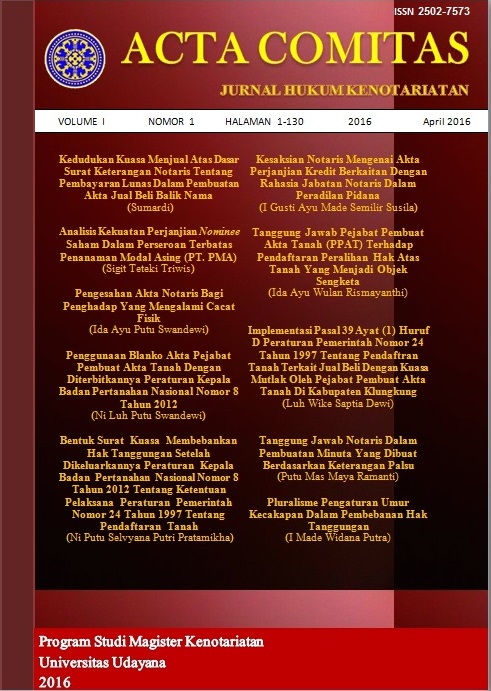Pengesahan Akta Notaris Bagi Penghadap Yang Mengalami Cacat Fisik
Abstract
The article 44 paragraph (1) of Law Number 2 of 2014 on the Amendment of the Law on the Position of Notary Public (hereinafter referred UUJN-P) provision a duty for the appearer to sign the notarial deed after having been read by the notary public, with the exception when the appearer is unable to put his or her signature then the appearer should mention the reason and it will be stated explicitly at the end part of the notarial deed. On the other hand, there is a difference in the arrangement of Article 16 paragraph (1) letter c of the UUJN-P namely the existence of an obligation that the notary public must affix the letters and documents as well as the fingerprint of the appearer on the minutes of the deed. The problem that arises is what if the appearer is illiterate, having handicapped or paralyzed hand so that he or she could not put his or her signature on the notarial deed, whether he or she is required to put his or her fingerprints on the minutes of the notarial deed as a form of his/her personal authentication on the notarial deed or as a form of his/her approval, weather the fingerprint can replace a signature, whereas what is meant by the fingerprint here also raises different interpretations.
The study is a normative legal research, it is as a result of a vacuum of norm about the signing of notarial deed when the appearer have physical disabilities that he or she cannot sign a notarial deed and to perform validation on an authentic notarial deed that he/she made. In addition, there is a duty of the notary to affix the fingerprint of the appearer on the minutes of the notarial deed, whether this provision also applies to the appearer who cannot sign the notarial deed because of his/her disability. The materials used are the primary, secondary and tertiary legal materials.
The results of the study indicate that the legal arrangements for the legalization of the notarial deed for the appearer who has a physical disability, especially in his or her hands, as well as the obligation to attach fingerprints on the minutes of the notarial deed has not been expressly stipulated in the Law Number 30 of 2004 (UUJN) and the UUJN-P. In particular to Article 44 paragraph (1), (2) and Article 16 Paragraph (1) c. that stipulate the appearer who has a physical disability condition can authenticate the notary deed, on condition that, the deed is eligible and conforms to the rules in Article 1320 of the Civil Code, Article 1868 of the Civil Code of the authentic deed and the Law Number 30 of 2004 of the Law on Notary Position in conjunction with the Law Number 2 of 2014 on the Amendment of the Law on the Position of Notary Public.
Downloads
Keywords

This work is licensed under a Creative Commons Attribution 4.0 International License.






